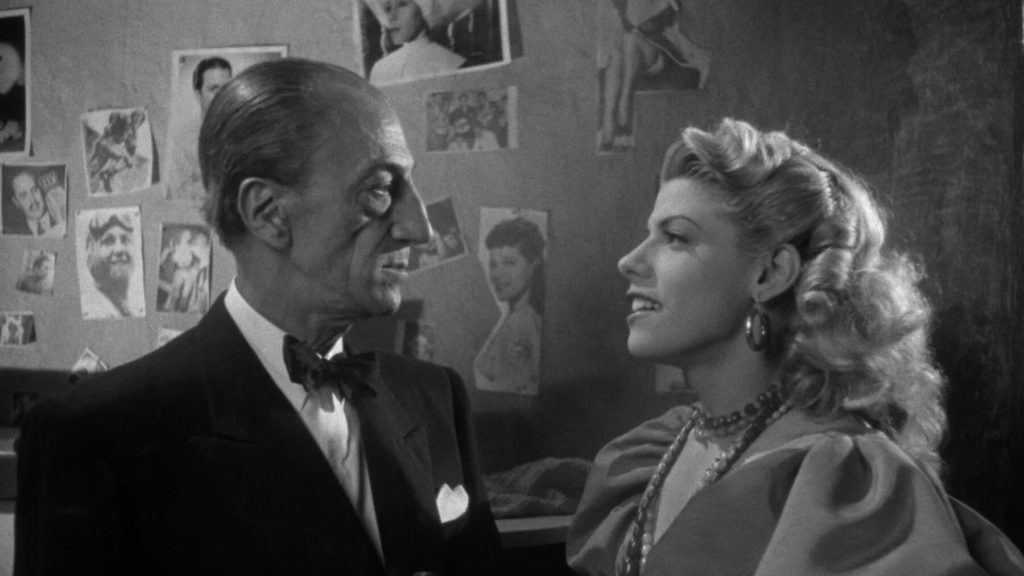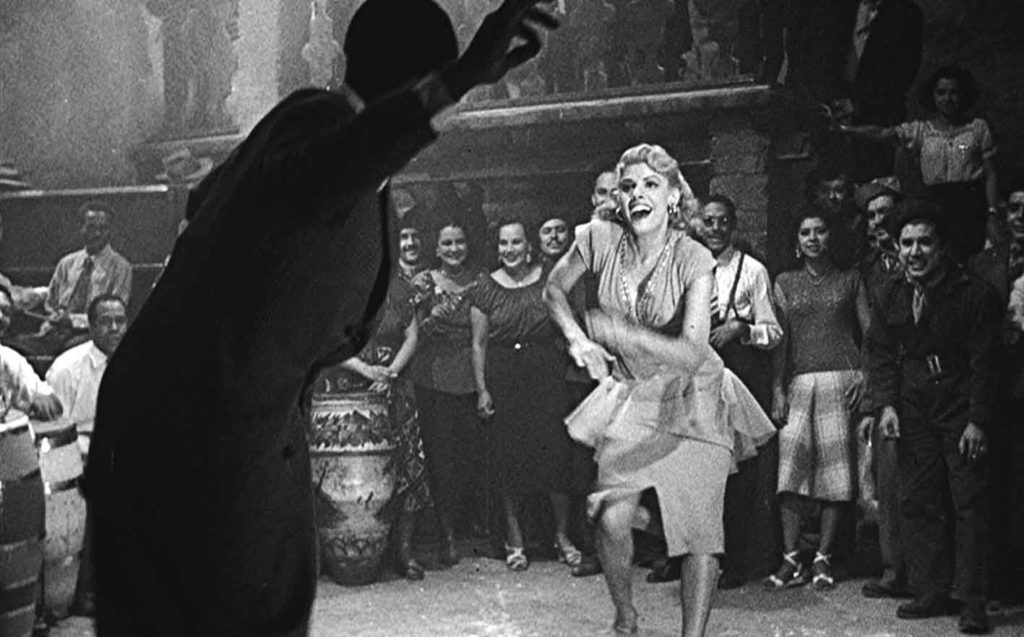|Nazeeh Alghazawneh|

Victims of Sin plays at the Trylon Cinema from Friday, March 1st, through Sunday, March 3rd. Visit trylon.org for tickets and more information.
As a pimp, the optics of being an absent, deadbeat parent are bad, but the optics of being a bad dancer are far worse—to abandon your child is your choice, but to falter in the corporeal shimmy-shimmy of a hot-blooded mambo dance number undermines the sovereignty responsible for your livelihood, and that’s not tenable. The world’s actual oldest profession, pimping, operates as a psychological ruse of authority, a performance of solipsism where your insidious nature is couched within the belief that your mere charm, the gift of your presence, is essential to life—like the sun. A pimp’s gotta dance to maintain appearances, magnanimously so, and the primary pimp in Victims of Sin is a fantastic dancer. Loose-footed, high-strung, transgressive exchanges of control and the illusion of it, between so-called pimps and so-called prostitutes, subverts the gendered smoke and mirrors of Emilio Fernández’s 1951 parable.
The term “parable” sometimes connotes negatively in art, as prioritizing a kind of life lesson above the medium’s form or entertainment value, but Fernández avoids this by grounding the setting in a shady mambo nightclub, Cabaret Changó, which serves as a “haven” of solicitation for the sex workers. The parable is made palatable when the ugliest of our humanity is laid bare, viewers cannot connect with purity, and the ghastly cast of players in the film mince no words intheir malevolence, clinging onto toxic social structures they’ve tangled up with their self-worth. Fernández understands that no one likes being lectured, so religious allusion—to the Bible, one of the most violent books in history—is only made in the title, Victims of Sin, allowing the plot and the characters to unfold organically.
A two-bit street pimp, Rodolfo, impregnates one of his girls, Rita, denies paternity, and immediately gives her the ultimatum of motherhood or staying with him by disposing of the baby. She chooses the latter. The psychology behind Rodolfo’s cruelty circles back to how precarious the economics of pimping are; business is only good for Rodolfo when he’s able to assert the illusion of his control by making the women believe the value of their humanity is strictly utilitarian, and only he can make them useful. A recurring thread the film deftly weaves throughout is biological family versus chosen family, for better or for worse; despite this baby being of her own flesh, Rita rejects it because she’s been manipulated into believing that Rodolfo is the only person in the world who cares about her.
My earlier reference to “so-called pimps and so-called prostitutes” inferred to how relative the relationship between power and control is between people who exist in a transactional space with one another, beyond a bordello. The line between who is the pimp and who is the prostitute is an imaginary one, a mirage on which the pimp’s entire credibility hinges. Here enters Violeta, a former prostitute who is now the main attraction of Cabaret Changó, being the hottest mambo dancer in town. Violeta’s various dance sequences are the most enthralling moments in the film. This comes from how the dance scenes are paced versus how the rest of the events elapse; many of the film’s more serious, life-altering plot developments happen suddenly, hastily, with an urgency that gives the characters barely any time to catch their breath. However, there is a hypnotic liberty to the dance numbers, almost languid, free of the chaotic, anxiety-inducing problems that plague these peoples’ lives. When talking about power, when identifying who’s in control, the sway of Violeta’s hips, and the effortless command of her body language she wields, intoxicates the entire room, and leaves them entranced.

Upon discovering Rita’s infant in an actual trash can, Violeta is horrified and attempts to return the baby to its mother. When Rita wants nothing to do with her child, Violeta adopts the child as her own (she names him Juanito), loving and nurturing him as if she had given birth herself. Don Gonzalo, the owner of Cabaret Changó, will not tolerate this, since this will take time away from Violeta making him money, and attempts to force her to abandon the child. However, the club owner fails to consider that Violeta is his bread and butter, and is pummeled by a mob of his own patrons once his main attraction quits and leaves. When Violeta (independently) returns to prostitution to provide for her child, she meets another club owner who allows her to solicit in his establishment, Santiago. He does not allow Violeta to refer to him as “Don Santiago” because according to him, “everyone in his club is equal.” Santiago’s character is a somewhat red herring of benevolence, by acting as a foil to Rodolfo. Santiago is not only empathetic to Violeta’s situation, but gives her money to look after her child, and eventually ends up marrying her. Santiago is a good father to Juanito, legitimately treating him as his own. The theme of chosen family over blood is once again presented, this time in a far more positive and healthy light than Rodolfo and Rita.
The film’s finale operates simultaneously as a marvelous desecration of the pimp and his image and as a karmic answer to who the “victims of sin” are from the title. Both of Juanito’s father figures—Rodolfo, biological, Santiago, adoptive—end up being killed, leaving Violeta as the only person to raise her son. No love is lost at Rodolfo’s death, as he’s almost cartoonishly evil, but Santiago’s demise lands in a moral quagmire, all the more sticky and tragic for its proximity to real life. Despite Santiago possessing many kind qualities that present as generous, he is ultimately just a far more effective pimp than Rodolfo could ever dream to be. Applying the old adage of “you catch more flies with honey than with vinegar” to his personality, and by extension, his business model, had made Santiago the club owner, instead of merely a club patron. His inability to disguise his wickedness as charitable made Rodolfo’s threshold to cause harm finite; his optics were serviceable as long as he wasn’t standing next to a real pimp. The Rodolfos of the world can be identified a mile away, rendering their societal influence insignificant. The icky reality is people like Santiago, who are able to weaponize their philanthropic qualities to create a dissonance of public perception, unfortunately, make the world go round. This is the reason why anyone who amasses obscene wealth has their own charity foundation or “Philanthropy” section on Wikipedia. Juanito will undoubtedly miss his adoptive father, but will inevitably end up a better person being raised without him.
Edited by Finn Odum
